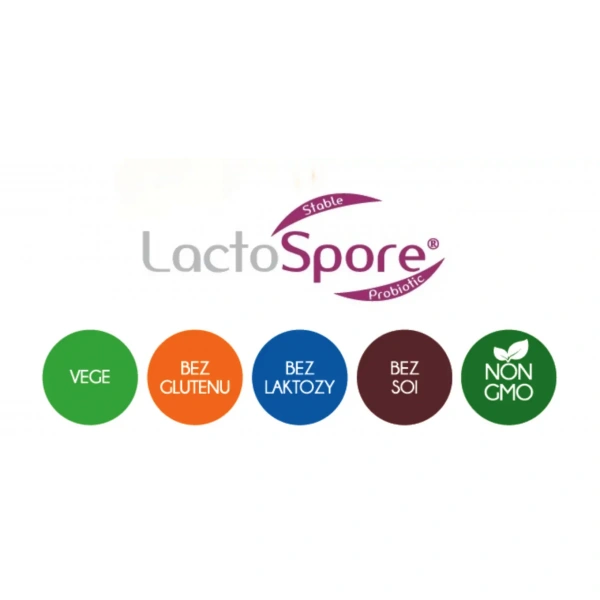- For the home
Health
- Bones and Joints
- Digestion and Healthy GI
- Essential Oils
- Fish Oil / Omega-3
- Healthy Sleep
- Heart and Cardiovascular System
- Immunity
- Liver
- MCT Oil
- Men
- Mind and Focus
- Minerals
- Pet Supplements
- Pro-Health Supplements
- Probiotics
- Senior
- Superfoods
- Urinary Tract
- Vitamins
- Vitamins for hair
- Vitamins for nails
- Vitamins for the skin
- Weight Management
- Woman
Healthy Diet
Herbs
Mother and Baby
Sport
Your Goal
Pet Supplements
Cosmetics
- Cosmetics for children
- Men's Cosmetics
- Unisex Cosmetics
- Women's Cosmetics
- Dezodoranty i perfumy
- Higiena jamy ustnej
- Kosmetyki akcesoria
- Kosmetyki dla dzieci2
- Kosmetyki do ciała
- Kosmetyki do higieny intymnej
- Kosmetyki do opalania
- Kosmetyki do pielęgnacji ust
- Kosmetyki do twarzy
- Kosmetyki do włosów
- Papier toaletowy / chusteczki
ALINESS Multi Enzyme Complex PRO (Digestive Enzymes with Probiotic and Prebiotic) 90 vegetarian capsules
Available: 17 szt.
13,43 €
Price per portion: 0,15 €Available: 17 szt.
After purchase you will receive 55 pts
Product Details
- Description
- Dosage
- Ingredients Table
- About the brand
- Nutritional information
- Reviews (15)
- Articles
MULTI Enzyme Complex PRO contains an innovative complex of digestive enzymes. It consists of GMO-free and vegan-friendly enzymes with a broad spectrum of activity, including amylase, protease and lipase, obtained through the fermentation of Aspergillus oryze. These enzymes break down carbohydrates, proteins and fats while being immune to gastric juices while maintaining their digestive activity.
MULTI Enzyme Complex PRO also contains a probiotic-prebiotic complex called a synbiotic. The spores of Bacillus coagulans bacteria contained in it can be stored at room temperature. Glactomannan is a prebiotic fiber. It is a soluble fiber fraction derived from dietary fiber from fenugreek seeds.
Bromelain: This is a cysteine protease, a plant enzyme (proteolytic) that breaks down peptide bonds. Due to a number of properties, it is used in dietary supplements in many nutritional models and recommended for people with a less active lifestyle.
Papain: is also a plant enzyme from the protease subclass, obtained from the milk of green fruit and papaya leaves (Carica papaya). The ripe, sweet fruits of the cultivar not only enrich the diet, but also show a number of positive effects.
Betaine is an organic chemical compound that belongs to the great group of betaines. TMG is a derivative of glycine - the simplest protein amino acid that belongs to the group of 20 standard protein amino acids. Betaine dissolves perfectly in water, and in the stomach it resembles the action of hydrochloric acid (HCL). Hydrochloric acid (HCL) in the stomach is naturally produced and used to digest food as long as the stomach is working properly. Hydrochloric acid is one of the most important factors in determining how much our body will absorb the nutrients from the food we eat every day.
Yestimun® Beta-Glucan is a natural adjunct ingredient, made from brewer's yeast (100% Saccharomyces cerevisiae). It has many of its own clinical trials. Beta-Glucan helps to maintain the proper level of cholesterol in the blood.
Fibgerum ™ Acacia Fiber
- is an excellent source of soluble fiber
- has a high food tolerance
- has clinically tested prebiotic properties
- guarantees a minimum of 90% soluble fiber by dry matter
- it is non-digestible, with a high molecular weight polysaccharide purified using only physical methods, i.e. no chemical or enzymatic treatment.
- proven bifidogenic effect
- stimulates the production of short-chain fatty acids
- high intestinal tolerance up to 50 g / day
- low caloric value
About digestive enzymes:
Digestive enzymes are a group of enzymes secreted in the digestive system, mostly hydrolases (hydrolytic enzymes), that catalyze the breakdown of more complex to simpler (water-based) compounds. Digestive processes are similar in all heterotrophs (heterotrophic organisms) and involve the same or very similar groups of enzymes that are produced by specialized digestive glands. Enzymes are involved in practically every process in our body.
The three basic nutrients in food, i.e. carbohydrates, proteins and fats, are only absorbed by the human body after being broken down into smaller digestible molecules. The digestive process begins in the mouth, where salivary amylases injected along with saliva begin to break down complex sugars, such as plant starch, into smaller molecules. The food then travels to the stomach where it is enzymatically processed by a protein-digesting enzyme called pepsin, which is secreted by specialized cells in the stomach called main cells. Then, thanks to the peristaltic movements of the gastrointestinal tract, the stomach contents are transported to the small intestine. There, pancreatic juice along with bile secreted from the liver via the gallbladder facilitate the further digestion of sugars, proteins and - importantly - dietary fats. Appropriate enzymes, i.e. pancreatic amylase, carboxypeptidase, and lipases, are provided with pancreatic juice. Pancreatic lipase hydrolyzes fats into free fatty acids, which, under the influence of bile salts, transform into micelles, i.e. a form of dietary fat that is absorbed by the cells of the gastrointestinal tract.
EFFECT OF FOOD ENZYMES ON THE STATE OF ORGANISM
Although the work of the digestive system can hardly be seen, the amount of digestive juices and enzymes produced is impressive. For example, the average daily saliva production is between 1 and 1.2 liters. This is how much saliva is needed each day to initiate the digestive process. Equally impressive is the amount of juices and digestive fluids produced by the digestive system to support the entire process
Dosage
Take 1 capsule a day.
Serving Size: 1 capsule
Servings per Container: 90
Form: Vegetarian Capsules
Other ingredients
Aliness - Elevate Your Wellness
Aliness, a Polish company, stands at the forefront of prioritizing top-notch quality, trust, and security. With an unwavering commitment to excellence, their products adhere to the "clean label" philosophy. This signifies the absence of superfluous components, ensuring utmost transparency.
Their capsules are devoid of plasticizers, detrimental additives, or allergens, making them an ideal choice for individuals with gluten or lactose intolerance. Aliness places great emphasis on using ingredients that are free from genetically modified organisms (NON-GMO), fostering a natural approach to supplementation.
Cannot be used as a substitute of a healthy and balanced diet.
Consult your physician if you are pregnant or nursing.
Do not exceed recommended dosage per day.
Keep out of reach of children.
Best before: date on the package
All descriptions are the property of the www.mass-zone.eu. Copying or distribution is strictly prohibited! As per the Copyright Act from February 4th, 1994.
Manufacturer: Aliness Poland
Purchased it Several times. Good product. Definitely recommend it.
Purchased it Several times. Good product. Definitely recommend it.
Purchased it Several times. Good product. Definitely recommend it.
Purchased it Several times. Good product. Definitely recommend it.
Bardzo dobry produkt
Bogaty skład, szybkie działanie, poprawę trawienia zauważyłam dość szybko.
Jest w porządku
Szuper termék
Odczulam znaczną poprawę trawienia. Brałam 15 min przed głównymi posiłkami czyli 3 razy dziennie.
Bardzo dobry produkt, polecony przez dietetyka klinicznego
Bardzo dobry produkt
Polcecany produkt Przez mojego doeattyka. Pierwszy raz będę stosowala.
Polecam dobry produkt
Polecam, zamawiam już kolejne opakowanie.
Spełnia swoją rolę. Polecam!
We make every effort to ensure that reviews come from customers who have used or purchased the product. Reviews are collected, verified, and published according to the rules described in the store's terms and conditions.



























